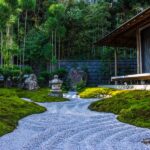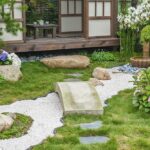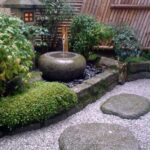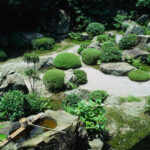Japanese garden design is a style of gardening that has been practiced for centuries in Japan. It is characterized by its simplicity, balance, and harmony with nature. Japanese gardens are carefully designed to create a tranquil and serene environment that encourages contemplation and meditation.
One of the key elements in Japanese garden design is the use of natural materials such as rocks, gravel, and wood. These materials are carefully chosen and arranged to create a sense of balance and harmony. Rocks are often arranged in groups of odd numbers, with larger rocks placed at the back and smaller rocks at the front to create a sense of depth and perspective. Gravel is often used to symbolize water, with carefully raked patterns that mimic the flow of water.
Another important aspect of Japanese garden design is the use of plants. Traditional Japanese gardens are known for their use of evergreen trees and shrubs, as well as flowering plants such as azaleas, cherry blossoms, and Japanese irises. Plants are carefully selected and pruned to create a sense of order and balance, with each plant chosen for its symbolic meaning and contribution to the overall design of the garden.
Water features are also a common element in Japanese garden design, with ponds, streams, and waterfalls often incorporated into the design. Water is considered to be a symbol of purity and renewal in Japanese culture, and the sound of running water is believed to have a calming effect on the mind and body. Water features are often surrounded by rocks, plants, and bridges to create a sense of harmony and balance with the natural environment.
One of the most important principles of Japanese garden design is the concept of wabi-sabi, which is the acceptance of imperfection and impermanence. This philosophy is reflected in the design of Japanese gardens, which are carefully designed to mimic the natural landscape while also embracing the passage of time and the changing seasons. This concept of wabi-sabi encourages visitors to appreciate the beauty of nature in all its forms, including its flaws and imperfections.
Overall, Japanese garden design is a unique and timeless art form that has been perfected over centuries. Its emphasis on simplicity, balance, and harmony with nature has made it a popular choice for gardeners around the world. Whether you are looking to create a peaceful retreat in your backyard or simply appreciate the beauty of Japanese culture, a Japanese garden is sure to inspire and delight all who visit.
















